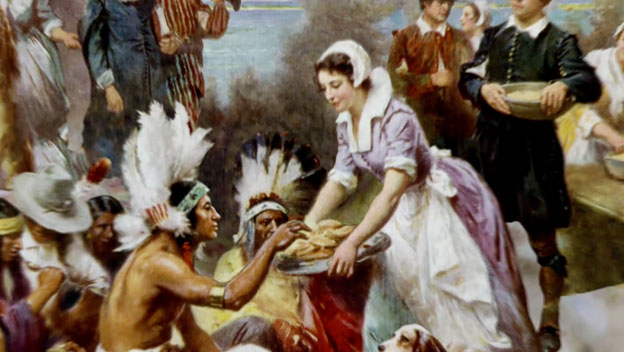A day of gratitude, not consumption
Thanksgiving Day’s first associations are usually turkeys filled with hot stuffing, soft pumpkin pies, thick golden gravy, silky mashed potatoes, and other unbelievably delicious goodies appearing on the dinner (or perhaps lunch) plates. And for high school students, Thanksgiving Day is definitely connected with the Thanksgiving break, which is a relief and wonderful repose for exhausted students.
How Thanksgiving originated, however, is somewhat debatable. The most well-known tale is probably how Pilgrims held a three-day feast in Plymouth to show gratitude to God for the year’s good harvest in 1621. On the other hand, author and editor Robert Haven Schauffler felt the holiday began much earlier in history. “[…] we may trace [Thanksgiving’s] origin back through the ages and the nations to the land of Canaanites from whom the Children of Israel copied many of their customs,” he wrote in his book Thanksgiving: Its Origin, Celebration and Significance as Related in Prose and Verse (1901).
Yet, there is something even more important to consider: What exactly is the true meaning of Thanksgiving Day for the modern-day society?
For more and more Americans, Thanksgiving appears to be increasingly tied with Black Friday, a day that signifies the beginning of the Christmas shopping season for certain states in the U.S., California among them. Of course, it is absolutely beneficial for the economy to have such a massive exchange in commerce. But when some stores begin to open on Thursday night, or even in the afternoon, things start to get a little strange.
Imagine the atmospheric differences; one is sitting at a huge dining table, passing around drinks and food, while the family chatters and talks with warmth, while another is maybe driving out into the darkness and cold, browsing over what is good to buy.
Both scenarios bring excitement, but the latter involves a more practical, materialistic feeling. Gone is the special glow of spending time with loved ones, and in its place, is an insatiable desire for more “stuff.”
The meaning of Thanksgiving is gradually altering. In terms of the spiritual side of this beloved American holiday, the openings of retailers on that Thursday provides a negative influence. Instead of gathering and celebrating together with family members and friends for the entire day, another notion intrudes and takes root. For many, Thanksgiving means shopping, and they shall hurry to the stores.
The true sentiment surrounding Thanksgiving is taking time to appreciate someone or something that makes you feel better, safe, warm, secure, learned, improved, happy, positive, and, of course, thankful. No matter who or what they are, shopping and food frenzies are not supposed to take away your privilege to say your “thank you” and the receiver’s rights to accept the gratitude they deserve on that specific day.
So maybe it’s time we turned away from the advertisements and coupons and flash sales, prepare for a little potential shyness, and say a few words of gratitude to those that are special to us. Thank you to Sarah Josepha Hale for advocating for this holiday. Thank you to President Abraham Lincoln for making Thanksgiving into a national holiday in 1863. Thank you to the modern pumpkin pie recipe for its tasty contribution. And thank you, reader, for taking the time to say thanks and spread a little warmth this Thanksgiving and all the other days of the year.

Hello everybody, I am Chun-Tzu Huang, a senior, and it is my second year on the Stinger staff. I am a lover of creative writing and a bit of a writing...

















































































![Senior Ditch Day... Relaxation or Truancy? [Video]](https://achsstinger.com/wp-content/uploads/2017/10/IMG_7119-900x599.jpg)
![Heavy Rain Hits Cam High [video]](https://achsstinger.com/wp-content/uploads/2017/02/maxresdefault-900x506.jpg)



